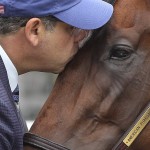 The world’s most expensive thoroughbred ever to sell at public auction has passed away. The Green Monkey succumbed to laminitis at his retirement home in Florida. He was fourteen.
The world’s most expensive thoroughbred ever to sell at public auction has passed away. The Green Monkey succumbed to laminitis at his retirement home in Florida. He was fourteen.
The Green Monkey brought $16m when sold to Coolmore in 2006 at the Fasig-Tipton Calder Select Two-Year-Olds In Training Sale. The colt was consigned by Hartley/De Renzo Thoroughbreds. By Forestry out of the Unbridled mare Magical Masquerade, it was a red letter day for Hartley/De Renzo, as they had previously given $425,000 for The Green Monkey as a yearling at the 2005 Fasig-Tipton Kentucky July Sale.
 After nearly seven years of legal wrangling, Monmouth Park Racetrack has won its right to sports betting after the Supreme Court announced this morning that the Professional and Amateur Sports Protection Act (PASPA) is unconstitutional.
After nearly seven years of legal wrangling, Monmouth Park Racetrack has won its right to sports betting after the Supreme Court announced this morning that the Professional and Amateur Sports Protection Act (PASPA) is unconstitutional. Upon reviewing one US jurisdiction’s rules of racing, in this example, the California Horse Racing Board’s rules, the penalty for a licensed trainer caught for a first “Milkshaking” event is a 30 day suspension plus a fine. A second offence – 60 days plus a fine. And if the trainer is found “Milkshaking” a third time? The penalty is a 90 day ban plus a fine – with a maximum imposable suspension of 365 days in the presence of “aggravating factors”.
Upon reviewing one US jurisdiction’s rules of racing, in this example, the California Horse Racing Board’s rules, the penalty for a licensed trainer caught for a first “Milkshaking” event is a 30 day suspension plus a fine. A second offence – 60 days plus a fine. And if the trainer is found “Milkshaking” a third time? The penalty is a 90 day ban plus a fine – with a maximum imposable suspension of 365 days in the presence of “aggravating factors”. It is hard to believe for this writer that almost three years have gone by since the countdown to American Pharoah’s 2015 Kentucky Derby. Since then we have had the likes of Beholder, California Chrome, Arrogate, Songbird and Gun Runner grace us with their presence. But there was, and only ever will be, one American Pharoah.
It is hard to believe for this writer that almost three years have gone by since the countdown to American Pharoah’s 2015 Kentucky Derby. Since then we have had the likes of Beholder, California Chrome, Arrogate, Songbird and Gun Runner grace us with their presence. But there was, and only ever will be, one American Pharoah.  Thoroughbred People writer Victor Ryan recently penned a “What’s Happening” piece on the initiative by the Georgia Horse Racing Coalition to build a brand new racetrack, and bring thoroughbred horse racing to the state. It is always uplifting to hear of a plan to build a new racetrack, and Thoroughbred People sincerely hopes it comes off for Georgia. What we also hope is that as a new track with a “21st century race track design”, it is indeed built differently to current tracks, and that a golden opportunity is capitalized on.
Thoroughbred People writer Victor Ryan recently penned a “What’s Happening” piece on the initiative by the Georgia Horse Racing Coalition to build a brand new racetrack, and bring thoroughbred horse racing to the state. It is always uplifting to hear of a plan to build a new racetrack, and Thoroughbred People sincerely hopes it comes off for Georgia. What we also hope is that as a new track with a “21st century race track design”, it is indeed built differently to current tracks, and that a golden opportunity is capitalized on. Thoroughbred racing’s casino bedmates are restless, and they want out. Is this really a shock to anyone? As soon as the gold digging casino operators had their feet parked firmly enough under the table to be able to survive without having to deal with and attend to the horses and horsemen they used to get in business in the first place, they were going to make a play to legislators and government for a case to leave those horses and horsemen behind.
Thoroughbred racing’s casino bedmates are restless, and they want out. Is this really a shock to anyone? As soon as the gold digging casino operators had their feet parked firmly enough under the table to be able to survive without having to deal with and attend to the horses and horsemen they used to get in business in the first place, they were going to make a play to legislators and government for a case to leave those horses and horsemen behind.  One of the major bright spots in horse racing in the last decade-plus has been the increased attention and care given to retired Thoroughbreds. Today there are dozens of organizations across North America that support nearly 200 facilities for horses whose racing career has come to an end.
One of the major bright spots in horse racing in the last decade-plus has been the increased attention and care given to retired Thoroughbreds. Today there are dozens of organizations across North America that support nearly 200 facilities for horses whose racing career has come to an end.  It was refreshing to hear of Remington Park’s efforts to try to help solve the problem of horse slaughter. Trainers at Remington who are caught disposing of horses for slaughter will now lose their rights to stalls at the track, and therefore their ability to train there. Hats off to Remington Park for this. It is a step in the right direction. But it doesn’t go far enough. If tracks can implement…
It was refreshing to hear of Remington Park’s efforts to try to help solve the problem of horse slaughter. Trainers at Remington who are caught disposing of horses for slaughter will now lose their rights to stalls at the track, and therefore their ability to train there. Hats off to Remington Park for this. It is a step in the right direction. But it doesn’t go far enough. If tracks can implement…